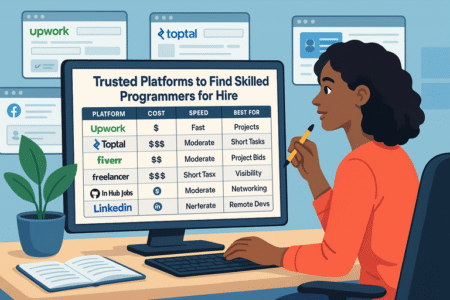Table of Contents
In our increasingly digital and remote world, freelance transcription jobs have emerged as a popular option for individuals seeking flexibility and independence in their careers.
As a freelance transcriptionist, you have the freedom to choose your projects, work at your own pace, and most importantly, operate from any location. But what exactly is freelance transcription, and why is it significant across various industries? Let’s delve into these areas.
What is Freelance Transcription?
Freelance transcription is a form of job where individuals, known as transcriptionists, convert spoken language into written text on a project-by-project basis. Unlike full-time transcriptionists who typically work for a single organization, freelance transcriptionists are self-employed, working with a variety of clients across different sectors.
The process involves listening to audio or video files and typing out what is said into a document. This can range from business meetings, interviews, and seminars to legal proceedings, medical appointments, and even multimedia content like podcasts or YouTube videos.
Working as a freelance transcriptionist often requires a keen ear, fast and accurate typing skills, a good command of the language you’re transcribing, and an understanding of transcription software and tools.
However, one of the most appealing aspects of freelance transcription is the low barrier to entry. With the right skills and dedication, anyone can start a career in freelance transcription.
Importance of Freelance Transcription in Various Industries
Freelance transcription plays a crucial role in numerous industries. In the legal field, transcription services are vital for creating accurate written records of court proceedings, depositions, and legal briefs. These transcriptions aid in maintaining transparency and fairness within the legal system.
In the medical sector, transcriptionists transcribe patient notes, medical histories, and diagnostic reports. This helps ensure clear communication among healthcare professionals and enhances patient care by providing accurate and accessible information.
Businesses and corporations utilize transcription services during meetings, conferences, or seminars. Transcribed documents help in maintaining an accurate record of these events, which can be referred back to, shared, or analyzed for insights and decision-making.
Moreover, with the rise of online content, transcription has become increasingly important in the media and entertainment industry. Transcribing podcasts, interviews, and video content not only helps in SEO but also increases accessibility for those who are deaf or hard of hearing.
Understanding the Pay Rates for Freelance Transcription Jobs
When it comes to freelance transcription jobs, one of the primary concerns that potential transcriptionists have is the pay. Understanding how much you can earn and what factors affect these earnings is essential when considering a career in freelance transcription.
In this section, we’ll delve into the elements influencing pay rates, the average earnings for freelance transcriptionists, and how these compare to full-time transcription jobs.
Factors Affecting Freelance Transcription Pay Rates
Several key factors influence the pay rates for freelance transcription jobs. One of the most crucial aspects is the level of experience and expertise. If you’re a seasoned transcriptionist or specialize in a particular field such as legal or medical transcription, you’re likely to command higher rates due to your specific skill set and knowledge.
The type of transcription also plays a role. Verbatim transcription, which requires transcribing every word, pause, and utterance, is generally more time-consuming and therefore pays more compared to clean transcription, where unnecessary content is edited out.
Language is another factor. Transcribing from or into less common languages can often command higher rates due to the supply-demand ratio. Additionally, the turnaround time can impact pay. Urgent jobs usually offer higher pay due to the quick turnaround required.
Lastly, the quality of the audio or video file can significantly affect the transcription rate. Poor quality files that are difficult to transcribe due to background noise, overlapping speech, or unclear voices usually pay more.
Average Earnings for Freelance Transcriptionists
While earnings for freelance transcriptionists can vary widely based on the factors mentioned above, the industry does have some general benchmarks. On average, a freelance transcriptionist can expect to earn between $15 and $30 per audio hour.
However, highly experienced transcriptionists or those specializing in fields like legal or medical transcription can earn up to $60 per audio hour or more.
Remember, these are earnings per audio hour, not per hour of work. Since transcription often requires careful listening and frequent pausing or rewinding, an hour of audio can take anywhere from 2 to 4 hours or more to transcribe depending on your skill level and the complexity of the content.
Highest Paying Transcription Jobs
Specialized transcription jobs typically pay the most. These include legal and medical transcription, where knowledge of industry-specific terminologies and confidentiality regulations are required. High-paying transcription jobs also exist in industries such as finance and technology, where complex jargon is often used.
Furthermore, transcription jobs requiring expertise in a particular language or dialect, or those requiring quick turnaround times, often pay higher rates. It’s important to note, however, that these higher-paying jobs usually require more experience and skill.
Comparing Freelance Transcription Pay Rates with Full-Time Jobs
When comparing freelance transcription pay rates with full-time jobs, several factors come into play. Full-time transcription jobs often come with a fixed salary and benefits like health insurance and paid leave. Freelance transcriptionists, on the other hand, have the potential to earn more by taking on more work, but they also bear costs like taxes and insurance themselves.
In terms of pay rate, freelance transcriptionists often earn per audio hour or per project, which can result in variable income. In contrast, full-time transcriptionists usually have a stable income. It’s also worth noting that freelance transcription allows for greater flexibility and control over your work schedule compared to full-time jobs.
How to Find Freelance Transcription Jobs
Navigating the world of freelance work can be daunting, especially when starting out. Knowing where to look for opportunities and understanding how to get your foot in the door are key steps towards launching your career as a freelance transcriptionist.
In this section, we’ll explore the best platforms for finding freelance transcription jobs, discuss opportunities suitable for beginners, and even share tips on landing transcription work with no prior experience.
Best Platforms for Freelance Transcription Jobs
Finding the right platform can be instrumental to your success as a freelance transcriptionist. There are several reliable platforms that cater specifically to transcription services, offering a streamlined way for clients and transcriptionists to connect.
Rev is one of the most popular platforms for freelance transcription jobs. It offers a user-friendly interface and provides a steady stream of transcription projects in various sectors.
TranscribeMe is another well-regarded platform that offers transcriptionists the opportunity to work on diverse projects, ranging from academic research to business meetings.
GoTranscript is known for its supportive community and offers feedback to help transcriptionists improve their skills.
Upwork and Fiverr are general freelance platforms that also host a variety of transcription jobs. These sites can offer greater flexibility in terms of setting your own rates and choosing clients.
Remember, while these platforms can be a great starting point, networking and building a personal client base can also lead to more opportunities and higher rates in the long run.
Freelance Transcription Jobs for Beginners
If you’re just starting out as a freelance transcriptionist, it’s important to look for opportunities that match your current skill level. Many platforms and companies offer beginner-friendly jobs to help you get your foot in the door.
For instance, both Rev and TranscribeMe are known for their beginner-friendly approach. They offer a variety of jobs suitable for beginners and also provide resources to help newcomers enhance their transcription skills.
When starting, it’s important to be patient and persistent. The initial jobs may not pay as high, but they are an invaluable opportunity to gain experience, build confidence, and enhance your transcription skills.
Freelance Transcription Jobs with No Experience Required
While having experience can certainly give you a competitive edge in the freelance transcription market, there are still plenty of opportunities for those with no prior experience. Companies like GoTranscript and Rev often have entry-level positions where the only requirement is passing a transcription test.
When applying for these roles, focus on showcasing your relevant skills such as typing speed, language proficiency, and attention to detail. Additionally, investing in a good quality headset and familiarizing yourself with transcription software can boost your chances of success.
Specializing in Different Types of Freelance Transcription Jobs
One of the significant advantages of a career in freelance transcription is the wide array of specializations available. Focusing on a specific area not only allows you to develop in-depth knowledge and expertise but can also lead to higher pay rates.
Among the most sought-after specializations are medical and legal transcription. Let’s delve into these sectors to understand what they entail and why they are particularly lucrative.
Freelance Medical Transcription Jobs
Medical transcription is a specialized branch of transcription services catering to the healthcare industry. As a freelance medical transcriptionist, you’ll transcribe audio recordings of doctors’ notes, surgical procedures, medical lectures, and patient histories into written form. This field demands a good understanding of medical terminology, exceptional attention to detail, and a strict adherence to patient confidentiality protocols.
Freelance medical transcription can be particularly rewarding. The demand for these services is consistently high due to the ongoing need for accurate medical records. Furthermore, as the field requires a specialized skill set, medical transcription jobs often offer higher pay rates compared to general transcription work.
To enter this field, you might consider taking a course in medical transcription, which can help familiarize you with the necessary medical terminology and practices. Additionally, some companies offer entry-level medical transcription jobs where you can learn on the job, although these positions may be less common.
Legal Transcription Freelance Jobs
Legal transcription is another specialized field where transcriptionists convert spoken language from legal proceedings into written form. This includes court proceedings, depositions, legal briefings, and attorney notes. Legal transcriptionists need to be familiar with legal terminology and formats, and they must maintain strict confidentiality.
The demand for legal transcription services is robust due to the legal industry’s need for accurate records. Similar to medical transcription, the specialized nature of legal transcription often means higher pay rates. Moreover, the range of possible clients, from law firms to court systems, presents diverse opportunities for freelance legal transcriptionists.
To get started in legal transcription, a background in legal studies can be beneficial, but it’s not always necessary. Several online courses offer training in legal transcription, providing the tools needed to understand legal jargon and the format of various legal documents.
As with medical transcription, some companies offer entry-level positions that provide on-the-job training, allowing you to build your skills and expertise over time.
Balancing Freelance Transcription Jobs with Other Commitments
One of the primary attractions of freelance work is its inherent flexibility. As a freelance transcriptionist, you have the freedom to manage your workload and hours, making it easier to balance your transcription work with other commitments.
Whether you’re looking for flexible hours, part-time opportunities, or are a student seeking to earn while you learn, freelance transcription jobs can be an excellent choice. Let’s explore how you can manage freelance transcription jobs alongside other responsibilities.
Freelance Transcription Jobs with Flexible Hours
The beauty of freelance transcription jobs is that many of them offer flexible hours. This means you can often work when it’s most convenient for you – be it early mornings, late nights, or during school hours if you’re a parent. This flexibility can be a significant advantage if you have other commitments, such as a full-time job, family responsibilities, or studies.
Platforms like Rev, GoTranscript, and TranscribeMe allow you to choose the projects that fit your schedule. However, bear in mind that some projects may have tight deadlines, so you’ll need to ensure you can complete the work within the given timeframe. Effective time management is crucial to ensure you meet your deadlines while balancing your other commitments.
Part-Time Freelance Transcription Jobs
If you’re looking for a way to supplement your income, part-time freelance transcription jobs can be a great option. You can decide how many hours you wish to dedicate to transcription work each week and pick up projects accordingly. This allows you to earn extra income without overburdening yourself.
Remember, though, that transcription is a skill that requires focus and attention to detail. So, it’s essential to ensure that you can devote adequate time and energy to your transcription work, even if it’s just part-time.
Freelance Transcription Jobs for Students
Freelance transcription jobs can be a fantastic opportunity for students looking to earn money while studying. These jobs offer the flexibility to work around class schedules, study times, and even during breaks. Moreover, they provide a chance to develop valuable skills, such as listening, typing, and time management, which can be beneficial in future career endeavors.
Platforms like Rev and GoTranscript are student-friendly, offering a variety of projects that you can take on based on your available time and skill level. However, it’s essential to strike a balance between work and study. Ensure that your transcription work doesn’t interfere with your academic commitments.
Skills Needed for Success in Freelance Transcription Jobs
As with any profession, success in freelance transcription jobs depends significantly on the skill set you bring to the table. While the barrier to entry is low, mastering certain key skills can set you apart in the competitive freelance transcription market and potentially lead to higher earnings.
Let’s delve into the essential skills for freelance transcription and discuss how you can enhance these skills for better earnings.
Essential Skills for Freelance Transcription
- Typing Speed and Accuracy: This is one of the most crucial skills for a transcriptionist. A good typing speed (around 60-80 words per minute) coupled with high accuracy can increase your efficiency and allow you to take on more projects.
- Listening Skills: As a transcriptionist, you’ll need to accurately convert audio into written text. This requires excellent listening skills and the ability to understand different accents and speech patterns.
- Language Proficiency: A strong command of the language you’re transcribing, including grammar, punctuation, and spelling, is essential. This ensures the transcriptions you produce are of high quality and need minimal revisions.
- Research Skills: You may encounter unfamiliar terms or references in the audio you’re transcribing. Being able to quickly research and accurately interpret these terms can increase the quality of your work.
- Time Management: Balancing multiple projects, meeting deadlines, and maintaining quality requires strong time management skills.
Enhancing Your Skills for Better Earnings
To increase your earnings as a freelance transcriptionist, consider investing in improving your skills.
- Improve Typing Speed: Several online tools and courses can help you improve your typing speed and accuracy.
- Advanced Language Skills: If you’re transcribing in a language that is not your first language, consider taking advanced language courses to improve your proficiency.
- Specialization: As we’ve discussed earlier, specializing in fields like medical or legal transcription can lead to higher pay rates. This usually requires additional learning to understand the specific terminology used in these fields.
- Software Mastery: Familiarizing yourself with various transcription software and tools can enhance your efficiency and the quality of your work.
- Continuous Learning: The transcription industry, like any other, evolves over time. Staying updated with the latest trends and best practices in the industry can help you stay competitive.
Conclusion: Is Freelance Transcription Right for You?
After exploring the world of freelance transcription jobs, it’s time to assess whether this is the right path for you. Like any career, it comes with its own set of pros and cons, which you need to weigh carefully.
If you decide to proceed, there are steps you can take to start and advance your freelance transcription career.
Weighing the Pros and Cons of Freelance Transcription
The primary advantage of freelance transcription is flexibility. You can work from anywhere, choose projects that fit your schedule, and balance your work with other commitments. It’s an excellent opportunity to earn money from home and is accessible to almost anyone, regardless of education or experience.
Freelance transcription also offers a variety of specializations, such as medical and legal transcription, which can lead to higher pay rates. Moreover, it provides an excellent opportunity to improve your language skills and learn about various fields.
However, freelance transcription is not without its challenges. It requires a high level of attention to detail and can be time-consuming. The pay can also vary, with some jobs paying less than others. There’s also the need to constantly seek out new clients and projects, which can be stressful for some people.
Taking the Next Steps in Your Freelance Transcription Career
If you’ve weighed the pros and cons and decided that freelance transcription is for you, it’s time to take the next steps.
First, build your skills. Practice typing, improve your language proficiency, and familiarize yourself with transcription software and tools. You might also consider taking a course in transcription or your chosen specialization.
Second, start seeking out freelance transcription jobs. There are numerous online platforms where you can find transcription work, such as Rev, TranscribeMe, and GoTranscript. Begin with simpler jobs and gradually take on more complex projects as you gain confidence and experience.
Finally, always strive for excellence in your work. Delivering high-quality transcriptions on time will earn you positive reviews and can lead to more job offers and higher pay.
Freelance transcription can be a rewarding career for the right person. With flexibility, a wide array of opportunities, and the potential for good earnings, it’s certainly worth considering if you’re seeking freelance work. Ultimately, the decision comes down to whether this path aligns with your skills, interests, and career goals. Good luck on your freelance transcription journey!






